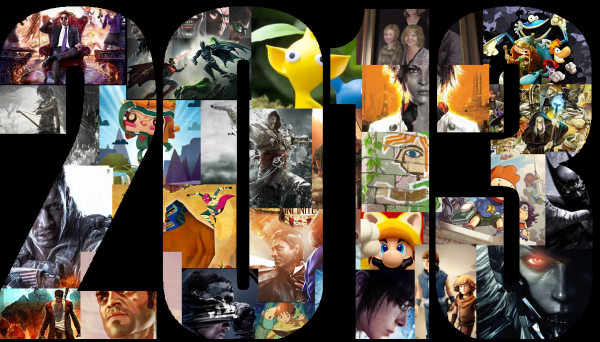
So, 2013. A strong year for games by anyone’s metric, though influenced by the kind of shifting expectations that always mark the transition point between generations. It’s been a year that has seen the zeitgeist increasingly demand evolution from the medium, particularly a hunger for new gameplay mechanics and forms, more mature and accomplished writing and abandonment of cliche , especially concerning gender and sexuality.
This year has also seen the availability of games on the cheap seemingly expand ever further, leaving us all with far more games at our disposal and just as little time to actually play them. Let us begin, then, with a shoutout to the games I wanted to play and didn’t get round to. Apologies, then, to The Last of Us (Due to not owning a PS3), XCOM: Enemy Within, The Bureau: XCOM Declassified, The Stanley Parable, Batman: Arkham Origins, and Metro: Last Light.
And then there are the runner-ups, the games that almost made the list:
Injustice: Gods Among Us – Ed Boon’s NeatherRealm Studios successfully bring the DC Universe to their MK 2009 engine with a nutso alternate-universe plotline that has Superman accidentally killing Lois, ripping the Joker’s heart out then obliterating Metropolis with a nuke. There’s your collateral damage, Snyder.
Far Cry 3: Blood Dragon – Take Far Cry 3, strip out the flab and offputting ‘magic white trust-fund kid’ plotline and throw in 80s action movie humour and Michael Biehn. Pure giddy fun that doesn’t outstay its welcome.
Assassin’s Creed IV: Black Flag – A rousing comeback for this mercurial franchise, and further proof of how much more fun these games get when they downplay the modern-world guff and go with a looser, less self-serious protagonist. A joy to play, and one of this year’s most pleasant surprises.
Rogue Legacy – This charming mix of Ghosts N’ Goblins, roguelike brutality and genetics makes for one of 2013’s most gleefully compulsive indie games.
So, on to the list proper. While trying to determine the objectively ‘best’ games of any year is an impossibility, this list is of the games that gave me the best experiences I had in 2013. There’s some slices of pure genius in there, but also a couple of legitimately flawed gems that I nevertheless had some of the best fun with this gaming year.
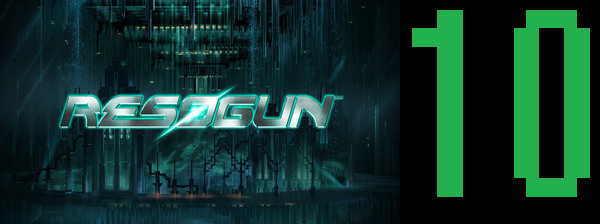
It’s practically tradition now for new consoles have a spruced-up retro revival game in their launch lineup, and Resogun follows this pretty much to the letter. An at first basic looking reinterpretation of Defender with the expected dazzling visuals (In Resogun‘s case throwing ridiculous amounts of voxels around the place to produce some gorgeous particle effects), it is at first tempting to accept it on those terms alone and move on.
However, as you play further you start to realize that developer Housemarque has thought this one through a little more thoroughly, and the game begins to encourage new techniques that drive your high score ever higher. Message board threads on the game have regularly turned into extensive strategy discussions, with new techniques seemingly discovered every week, and demonstrating a layer of depth that is truer to the great arcade classics than to the often superficial facsimiles we’re used to these days. Resogun may have come to us in the guise of a glorified tech demo, but underneath the sparkly twitch-fest hood is a videogaming monster designed for the long game.
Contributing Factors: Beautiful, processor porn graphics, with fun and immediate gameplay and tons of old-school depth.
Moment To Savor: “ARMAGEDDON” (Level melts into destructive voxel gorgeousness).
CHUD.com Pull Quote: “99, 000 particles and a twitch ain’t one”
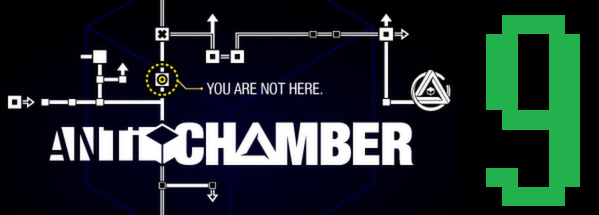
Your enjoyment of Antichamber, brainchild of Australian developer Alexander Bruce, is very much dependent on one’s own relationship with blatant, balls-out ridiculousness. While it is ostensibly a puzzle game, the real key to the game is accepting that it is an exercise in logic that isn’t as much backwards as it is looping back unto itself so much that it probably looks like some almighty pretzel of cognitive pain.
And that’s what makes it so fun. With puzzles based on the non-Euclidean geometry spawned by the game engine, progression is more a case of learning to accept the mantra-esque tips (Or are they philosophical nuggets? Or both?) plastered on the walls, throwing linearity to the wind and letting instinct be your compass. When this really starts getting ridiculous is when you start to see this approach working, and you start to progress as your brain begins to twist itself to fit the game.
A labour of love for Bruce (Who spoke at length at PAX Australia about the multitude of sleepless nights he suffered developing the game on and off over four years), Antichamber is at heart a loving but merciless fucking-over of what you expect from the spatial qualities of a game world, and is quite the beautiful kick in the lobes if you’re looking for something a bit different.
Contributing Factors: Great, minimalist music and aesthetics and a gleefully insane twist on 3D space combined with some genuinely clever puzzle design.
Moment To Savor: The Leap of Faith – the moment where the game demonstrates how it wants you to do the least likely thing at all times, and sets the tone for the mind-bending journey ahead of you.
CHUD.com Pull Quote: “M.C. Escher and Douglas Adams have Portal described to them verbally, then try to make the game themselves.”

As one of the last blockbuster games of the outgoing generation, and sequel to one of the key games that defined it, BioShock Infinite was always going to be A Big Deal. As a late-gen game, it also has a distinct feel of ‘last of its kind’ about it as Irrational’s ambitions towards more literary storytelling rub up against gameplay and design that hark back to a time when tonal consistency was not as big an issue as it is today (First person to say ‘ludonarrative dissonance’ buys the first round).
As a result, Infinite is, admittedly, a bit of a mess. It’s a game that attempts to comment on racism, religion and exceptionalist ideology but is too busy flitting between them to squeeze any real juice out of any of them; a game that tries to craft a strong, nuanced female character (Troubled dimension-jumper Elizabeth) but can’t stop her from falling into an all-too-familiar ‘damsel in distress’ routine; that promises an exploration of an exciting new world and the toll violence has taken on an individual (Protagonist Booker DeWitt), but ultimately loses its grasp on these ambitions in favour of the familiar routine of walking forward and shooting lots of shit.
So if Infinite is so flawed, why have I put it on this list? Because as scatterbrained and unfocussed as it may be, you won’t find a more spectacular rollercoaster of a game this year. 15-20 breathless hours see you rush from one frantic setpiece to another, utterly gorgeous visuals and impressive production values wherever you look. This is videogaming as Hollywood epic, and is an essential ride even when it can’t work out what it wants to be. It may just be the final statement for what we know the modern action-adventure game to be, flaws and all, and on those merits alone stands as one of the most memorable experiences of the year.
Contributing Factors: Production value up the wazoo, some moments of pure action gameplay and some genuinely strong voice acting give BioShock Infinite a compelling character, even when its logic isn’t always entirely consistent.
Moment To Savor: Seeing Ken Levine vanquish the ghost of BioShock‘s notoriously lacklustre climax by throwing dimensions by the handful – And a familiar haunt – at us, ending the game on a gloriously surreal note .
CHUD.com Pull Quote: “The most shocking thing to happen in the clouds since Steven Seagal fell out of that plane in Executive Decision“
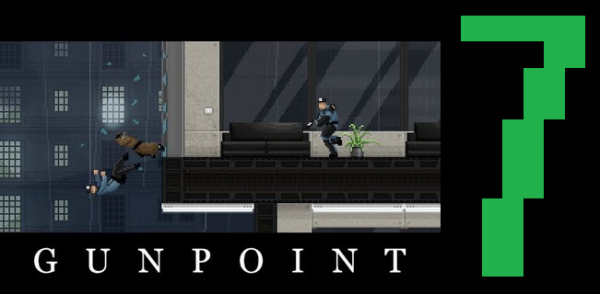
It finally happened. Someone finally made a speedy stealth game, and all it took was an ex-section editor for PC Gamer to make it work. Tom Francis saw unexplored alternatives to modern game design and, having tired of complaining about it in reviews, decided to learn to code and put those ideas into practice. This extracurricular project became Gunpoint, a stealth game that feels more Sonic than Splinter Cell but still miraculously works the same way.
You’re still making your way through buildings, still avoiding guards, still dodging light sources, and yes, still hacking stuff. The difference is, you’re doing it with a speed and smoothness that quickly becomes second nature, and while the game is fairly short there’s enough depth to encourage repeated playthroughs. The Crosslink, the gadget you use to hack into local electrical systems, is the game’s masterstroke, allowing you to do the kind of electric rewiring most other games would need an impenetrable puzzle system to get across. With the Crosslink it’s a simple case of redirecting power lines to, say, make a light switch control a security door or shut down an alarm system, and making the business of screwing up your pursuers’ day something you can accomplish on the fly.
While Gunpoint isn’t the first game to truly nail 2D stealth (Last year’s Mark of the Ninja deserves that honour), it does succeed in making it viable with arcade gameplay, removing everything that puts of non-fans of the genre while preserving that all-important stealth feel. Evolution in games is usually a slow, incremental process, but every now and again you get a game that takes a big leap all at once and feels like the birth of a new genre. Gunpoint is such a game.
Contributing Factors: Simple yet complex design, a refreshingly irreverent sense of humour for the genre and, more importantly, speed.
Moment To Savor: When you realize that you’ve just weaved around streetlights to reach a building, beat a security guard so severely you terrified the game itself, wired a light switch to a security door, hacked a computer then jumped out a window to make your escape… And start to finish, done it in thirty seconds.
CHUD.com Pull Quote: “You will believe stealth can fly.”
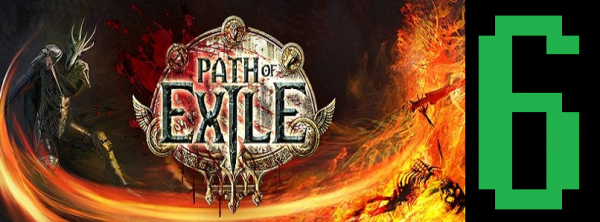
With Diablo 3 disappointing many, ARPG fans on the PC have been left with slim pickings these last couple of years with only the Torchlight making a meaningful attempt at filling the gap. Enter New Zealand’s Grinding Gear Games, whose Path of Exile finally received an official release in October after a long and hugely successful public beta.
PoE, with its darker tone and complex skills system, is basically catnip for PC gamers searching for a successor to Diablo 2. It’s classic ARPG fare – simple quests, kill stuff, watch your weapons and armour get flashier and cooler and gradually grow your character into the walking embodiment of Death Itself. Weapons and armour are upgraded via socketable gems, but it’s the passive abilities that are the star of the show – all 1300-plus of them, arranged in a skill tree that will give min-max hounds the vapours.
PoE plays it smartly by throwing all the complexity at the character screen, but keeping the business of questing reasonably straightforward, resulting in a game that is easily picked up but has depth to last as long as the player likes. Even better, the game is free-to-play, meaning that anyone can scratch that ARPG itch even if Diablo 3‘s issues have put them off laying down cash for this kind of game. And to settle any rising concerns: Grinding Gear only offer cosmetic items on their online store. Everything else – and more importantly, everything that directly affects the gameplay – is only earnable in-game. It’s an admirable approach to F2P at a time when even full retail games are striving to sell extra pieces of games even after the payment of the supposed RRP.
Contributing Factors: ARPG gameplay as strong as your Diablos and Torchlights, boosted by a deep and flexible upgrade system and that all-important sense of rising power, with satisfyingly gory results. Gorgeous graphics that look great even on lower-tier PCs. A ‘Free-to-play’ system that doesn’t mean ‘reamed by microtransactions’.
Moment to Savor: Studying the skill tree for the very first time.
CHUD.com Pull Quote: “Exile on Pain Street.”
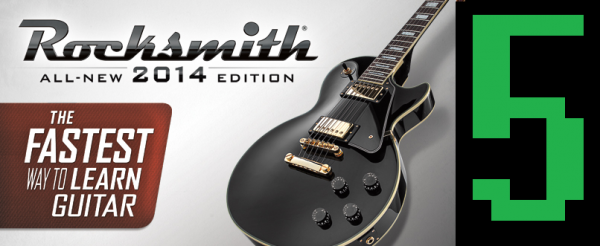
2011’s Rocksmith was a ballsy release. Not only did it attempt to start a new franchise right at the point that the bottom fell out of the rhythm game market, it tried to encourage gamers to toss away their plastic instruments and try the real thing. This was a gambit already attempted by Rock Band 3 and, in a more notoriously/hilariously inept fashion, Power Gig: Rise of the Six-String, with neither attempt finding purchase with gamers. Not even favourable reviews were enough to save Rocksmith from a great deal of skepticism on its debut, though it became something of a sleeper hit as more and more people tried it and realized that it actually worked – maybe not as the all-in-one teaching tool the franchise’s marketing claims, but as a fun and effective practice tool.
Rocksmith 2014 Edition does exactly what you hope a sequel should: throw out all the bad stuff, and make the good stuff better. Gone are the endless, clunky menus of the original to make way for a faster and smoother UI and all-but instant load times. While it still may not quite trump face-to-face tuition when it comes to the fundamentals of guitar playing, its real focus is on the most important part of learning guitar: playing songs over and over, mastering them, then moving on to more complex material. Rocksmith 2014, with its strong on-disc tracklist and huge amount of DLC from both releases, provides players with a huge library of songs to perfect using the Riff Repeater tool (Which, in an act of mercy on the part of Ubisoft, is now instantly accessible mid-song).
With a Score Attack mode and a series of arcade-style minigames honing on specific techniques, and this year’s big addition, Session Mode (Which lets you jam with a virtual band) proving a surprisingly fun and effective way of increasing one’s familiarity with the neck and finding scales, Rocksmith 2014 provides a hugely compelling suite of practice tools to benefit players both new and experienced.
Contributing Factors: Massive improvements in UI, accessibility and tracklist mean that the franchise is finally proving that ‘Guitar Hero with real guitars’ can not only work, but be a valuable tool for keeping the grunt work of learning an instrument fresh.
Moment To Savour: Nailing a difficult song, or even a particularly tricky passage, has given me some of the biggest ‘buzz’ moments of any game this year – and it’s possibly not even a game, depending on your semantics of choice. Also, playing the Ramones’ ‘Blitzkrieg Bop’ at wall-pounding levels can never be not fun.
CHUD.com Pull Quote: “The real guitar hero saves the day!”
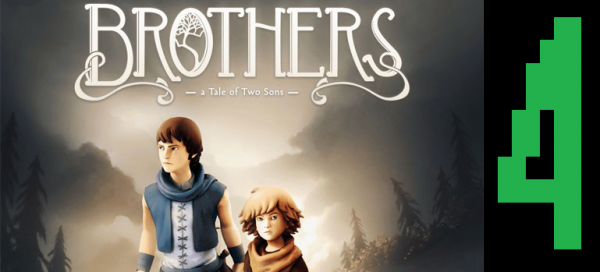
And now we get to one of two games on this list that are so eminently spoilable, and so dependent on the player knowing as little about them as possible going in, that they’re almost impossible to write about in any depth. Brace yourselves for imminent professional vagueness…
In these media-saturated times, it’s rare for genuine dark horses to come along in gaming. Brothers, a single-player sort-of co-op game from Riddick/Syndicate developers Starbreeze, amply fits that bill. A collaboration with Swedish filmmaker Josef Fares, it sees the developer boldly diverge from their signature FPS formula to deliver a striking cross between Ico and the Brothers Grimm.
As the title suggests, you play as two brothers tasked with collecting water from a magic tree to save their ailing father. The game’s stylistic twist is that you control both brothers at once, with each assigned one of the thumbsticks, and your job being to manipulate them to solve environmental puzzles and negotiate hazardous terrain. If it sounds awkward, well, it is, but not as much as you’d think and the game does a wonderful job of justifying the thumb gymnastics it demands of you.
While Brothers‘ take on fairy tales is hardly new – throw a rock in any random direction and you’ll hit an ‘adult’ fairytale adaptation – the game wins through with genuine heart. You never fail to believe the relationship of the brothers (Justifying its at first overly-obvious sounding subtitle) and the game does a great job of being dark while maintaining the sense of an organic world. Although the story doesn’t always avoid the realms of cliche, Brothers still manages to provides a harmony of writing and gameplay that shows just what potential videogames have as an effective storytelling tool.
Contributing Factors: Beautiful graphics with consistently compelling design work, married to a genuinely heartfelt and well-written story and wonderfully judged mechanics.
Moment To Savor: You know how everyone keeps talking about how they want to see game mechanics melded perfectly with storytelling? Brothers does this throughout its length, and there’s one moment in particular where these things intersect so powerfully yet so smoothly and with so little fanfare, you’re likely to not even notice it straight away. The moment you do, however, will stay with you for life.
CHUD.com Pull Quote: “Proof that combining a filmmaker’s vision with a game dev doesn’t always have to result in Enter The Matrix“

Who would’ve thought back in 2006, when the first Saints Row emerged as a mediocre GTA clone, that in seven short years the series would have not only evolved into one of the best open-world franchises around but would have garnered enough of a fanbase that a new entry would reach fever-pitch levels of anticipation even despite a new GTA arriving barely a month later?
The answer is that developers Volition were smart and watched the competition. The more Rockstar pushed for cultural legitimacy, the more they stuffed their games with the kind of brash, crude lunacy that was once GTA‘s calling card, to the point that by the time 2011’s Saints Row The Third came along, the mentalness had snowballed past the point of imitation and become a monster all of its own. There was no moral dissonance to be had, because this was a world that had no interest in morality: it was Scarface via the Mystery Machine gang.
With the THQ bankruptcy case finally resolved and the property going to Deep Silver, Volition could finally go about topping The Third, an unlikely goal that they amazingly pulled off by throwing in an alien invasion, a Matrix-style simulation/prison and the addition of superpowers. Oh, and by making you the President. The Super Gangster President. With a Dubstep Gun. And Keith Motherfucking David as your Vice.
I believe this is where one drops the mic.
Contributing Factors: The now-expected open-world lunacy we’ve come to expect from Volition, also including the best superhero game since Crackdown. Powers that are an absolute ton of fun to use and, with a multitude of hard-to-reach collectables clearly inspired by Realtime Worlds’ unsung masterpiece, making traversing virtual Steelport almost as much fun a game as the game itself. Hilarious writing and voice acting. Did I mention the Dubstep Gun?
Moment To Savor: Like there’s ever a time when summoning a shotgun-wielding Keith David to fight alongside you is ever a moment to not savor.
CHUD.com Pull Quote: “The Saints maintain their flow, exorcise the ghost of THQ with ballistic dubstep and come into their own.”
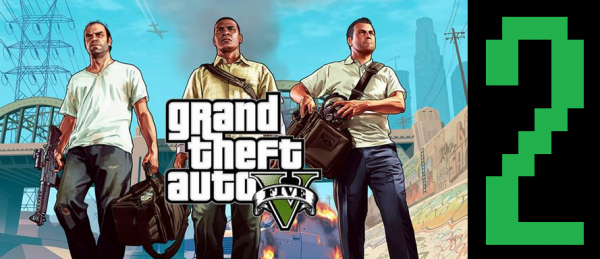
Much like BioShock Infinite, GTA5 feels like the grand statement of a fading age of games. Rockstar maxed out the scale and detail of their worldbuilding, creating a Los Santos that is downright stunning to behold – especially on the consoles, which the game pushes to their very limits.
In many ways, the game is the pinnacle of the ‘GTA style’ as we know it, with Rockstar regaining the balance between realism, chaos and drama that slipped so far out of whack with GTA4. Rockstar still try for cinematic weight but with a lighter touch than in Niko Bellic’s story. That said, the old dissonances are still there – Rockstar know it, and this time practically make the story an admission of it, turning many people off with the often blatant unlikeability of the three central characters. My own theory is that this is exactly what Rockstar intended, in what constitutes a meta commentary on their own audience, based on how we’ve trained ourselves to approach GTA and other sandbox games .
Basically, you can think of GTA5‘s three protagonists as representing the three main ‘modes’ of play the sandbox player shifts between. There’s Michael, who is the Main Story Guy – he’s the main focus of the plot, the guy the main ‘canon’ of the story happens to, and the only one who gets an easily-identifiable character arc. Then there’s Franklin, the Side Missions Guy, defined by his constant running around doing other people’s shit work out of some vague sense of progression but with very little autonomy of his own.
And then we have Trevor: Sandbox Guy. The unleashed id of the player, who knows it’s a game, pushes it to subvert conventional morality as much as it’ll allow and stand outside the ‘real’ story (Note how Trevor is completely separated from Michael, his functional opposite, at the start of the game, both geographically and socially). Even his wildly changeable sense of empathy can be seen as a reflection of how players will wreak havoc with the protagonist but see it as ‘not really mattering’ until they go back to the ‘real’ story missions.
Basically, Rockstar use GTA5 to shine a light on the players themselves and, as is their wont, take the piss a little. No surprise then, that many have reacted negatively to them. What this does make one wonder though, is where Rockstar can go from here. The mission design and activities are as numerous, well-designed and outright fun as they’ve ever been but it does beg the question of how many more times they can employ the same template, and turning a meta eye to their own fanbase does suggest a climax of sorts. It’s still a wonderful ride, even if we know where all the dips are, but the generation changeover feels like a natural point to pull together a few new tricks.
Contributing Factors: Traditional open-world gameplay at its most precisely designed and paced, in a Los Santos that never stops astounding in its sheer detail. Rockstar’s dramatic ambitions exercised in a slightly less heavy-handed form than before, with some truly Bay-worthy setpieces. The fun and inventive heists, of which there are sadly too few. While the game’s humour does have a sense of ‘reheated comedy routine’ about it, it still provides a good few genuine laughs.
Moment To Savor: Michael’s various drug experiences, from a startlingly beautiful and hilarious Coen-esque trip to his self-loathing rants while baked on his son’s stash. I could also mention the ridiculous amount of time I spent making Michael take running headbutts at oncoming cars to make my brother laugh, but that would just be wrong and immature to bring up. So I won’t.
CHUD.com Pull Quote: “The open-world kingpin reasserts its authority, for now at least”

It’s the ones that sneak up on you that often make the biggest impression. While Gone Home arrived with a negligible amount of hype, mostly due to debuting indie developer The Fullbright Company including people who had worked on BioShock Infinite and the excellent Minerva’s Den DLC for BioShock 2, any real anticipation for the game was generally felt within the indie scene as opposed to any significant mainstream buzz.
That wouldn’t last long. While part of the emerging ‘narrated exploration’ subgenre to this point represented mainly by Proteus and Dear Esther, Gone Home tackled the concept with a complexity at this stage arguably matched only by The Stanley Parable, which was still primarily known as a mod. Coupled with a story that wanted to do something… Let’s say different to your average videogame, it attracted the expected range of cheers and jeers, though a lot of the naysaying was directed towards its cost-to-length ratio ($20 for 2-2.5 hours of gameplay).
While that concern was understandable, it also betrayed another rather old-fashioned way of thinking that was more a hangover from what games have been, as opposed to the legitimate entertainment form everyone wants them to be. No-one balks at paying twenty bucks for a two-hour movie; in fact, these days you pay more. And while the argument would hold much more water for a more traditional ‘videogamey’ kind of videogame, Fullbright’s ambitions with this game are more about narrative than mechanics, or any exercise of skill. Kaitlin Greenbriar’s mystery-filled return home is a journey of discovery, not only about the strange emptiness of her family’s ominous new abode but about her sister Sam, and the dynamics that have influenced her family’s entire history. It’s almost as far from what we expect from a traditional videogame as you can get.
And yet I’ve picked this not-really-gamey game as my favourite of this year. To really get into the nuts and bolts of why would mean venturing into spoiler territory, but suffice to say that Kaitlin and Sam’s story, while not exactly original per se, touched me at the same gut level we wish for from any good art. It’s a simple story told with such heart and skill, you stop caring that it’s a game: all that matters is getting through that house, finding out what happened to Sam and praying you don’t encounter the unnamed horror that seems to lurk around every corner. It’s a game that made me feel empathy, affection, fear and relief to a cellular level, things that very, very few games have made me truly feel. Gone Home represents the two most involving and moving gaming hours I spent this year, and on those terms alone made it the undisputed game of my year.
Contributing Factors: A great sense of atmosphere and mystery, and a playful approach to more traditional/expected videogame tropes. Wonderful writing and voice acting creating a vibrant cast of characters, none of whom you never actually see apart from in photographs. An excellently designed space that feels like a real aged mansion, right down to the nooks, crannies and spaces both visible and hidden. A lovely score courtesy of Chris Remo.
Moment To Savor: That would be telling. But I will say that it took me on an emotional rollercoaster I’ve not experienced in any other game. Saying any more would seriously risk spoiling something all self-respecting gamers should try (And with the Steam Christmas Sale imminent, even the price barrier will be gone. Buy this game. Trust me.)
CHUD.com Pull Quote: “Most games are simply content with being loud; Gone Home has a voice, and one that deserves to be heard.”